Like father like son
Sahan Ranwala continues mission to unearth Lankan
folk music heritage:
Ruwini JAYAWARDANA
Sri Lankan dance forms have already made an impact in the global
arena. Anyone who has witnessed the graceful moves of the traditional
Kandyan dance will be able to gather the Sri Lankan identity within its
techniques. With many forms of music filtering into the scene and
transcending to the heights of fame, there is a dire need to establish a
form of Sri Lankan identity through folk music.
|
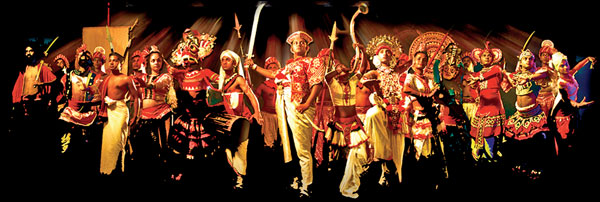
Yuddhetath Evith |
The rich musical tradition in the country had been hidden within the
shadows of the rural community for years. Sadly, nobody had heeded it or
had shown interest to fine tune it, popularize it and bring it into the
mainstream music - till lately. This is when father-son duo, music
virtuoso Lionel Ranwala and Sahan Ranwala broke into the scene.
Rich melodies
Backed by the dedication and passion to keep the local pulse of the
music scene alive in the country, Lionel Ranwala had joined hands with
W.B. Makuloluwa to venture to rural villagers where the age old
tradition of Sri Lankan folk singing culture lies hidden within the
folds of the daily lifestyle of the community. The mission which had
made great bounds in the local entertainment scene, winning applause
from music enthusiasts, nearly came to a stand still had not Sahan
Ranwala, the son of the late pioneering dramatist and musician stepped
into the scene.
The Lionel Ranwala troupe, established by the maestro, is now led by
Sahan and aims at bringing the rich melodies of the local folk song
tradition into the mainstream realm.
|
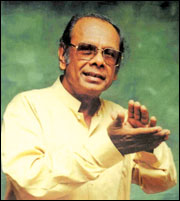
Lionel Ranwala |
Remembering Ranwala
The seventh death anniversary of
Sri Lankan music maestro Lionel Ranwala falls on November 13.
The musical genius who revolutionized the local music scene by
bringing folk music to the limelight while preserving their
originality joined the late W.B. Makuloluwa in his hunt for
research on the subject.
His main aim was to introduce the ingredients of Sri Lankan folk
music to youth. Never one to seek cheap publicity, Ranwala’s
mission was to take the local music tradition to every segment
of the society so that one day Sri Lankan can make the imprint
of a musical tradition of their own in the world.
“He saw ahead of time. Whenever we come across a problem, we
recall that my father made a reference to the issue during his
period,” Sahan noted.
His two sons, Sahan and Chirantha have taken on the daring task
of taking his operation forward by imparting knowledge and
instilling the disciples of folk art in the younger generation
with the aspire of creating a form of great local traditional
music in the coming years. |
“We hope to establish Sri Lankan musical identity based on folk
music. A country is represented by its culture, not by its acres or the
number of people in the society. Each country possesses its own unique
features embedded within its culture. Traditional art forms are one of
these aspects.
Musical identity
These have to be located and laced into fascinating creations. That
is the method in which it could be brought into the limelight and
popularized among masses,” Sahan explained the momentous challenge
before the Ranwala troupe.
Having grown up witnessing and breathing the local rhythms of music
while giving voice to many of his father’s creations, Sahan states that
melodies are the deciding factor in music.
He says: “Language is not a barrier. There are many foreign songs
which we enjoy without understanding its meaning. In most instances, you
can make out the identity of the country which the song originated by
following the melody. A listener is able to distinguish a Japanese
number from an Indian song or a Western track because all these
countries have developed their own musical identity.”
Focusing on the history of Sri Lankan folk music which had
transcended many decades, handed orally from generation to generation,
Sahan noted that the art had surfaced from the villagers’ habit of
composing and singing verses aloud while engaging in daily chores.
“They would compose verses while watching over their crops at night,
rowing boats, picking water lilies or driving carts. There are various
forms of folk songs for
|
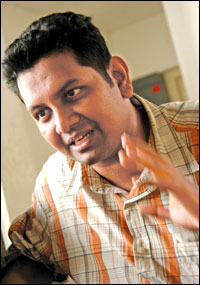
Sahan Ranwala. Picture by Ruwan de Silva |
each task. At times when a person starts singing, others join
in by adding more stanzas. The chores bonded with the villagers had a
certain rhythm. Their life did not include mechanical mores,” he opined
while adding that folk songs reflect the ideologies of the villagers.
With musical trends like rap, RnB and Pop becoming increasingly popular
among youngsters today, one can only wonder what form of art form will
hit the country’s entertainment field in the coming years. However Sahan
has a positive note in looking at this angle. He says that the popular
culture and national culture are poles apart and what had achieved fame
does not necessarily indicate that it is morally correct.
|
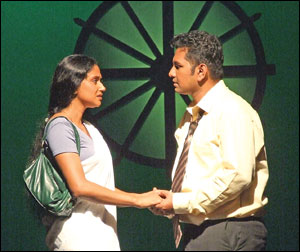
A scene from Velava Keeyada? |
“Popular culture needs to exist but it is not essential to take it
up. Our goal is to make the right thing popular. We have picked up
trends which have been far outdated in the West. It enters our country
and becomes popular here after it had become stale in the country which
it originated from. Rap is not a new genre because some of our folk
songs like Athuru Mithuru include parts which go parallel to the rap
style.
Children’s folk songs
We need to recognize our features and polish them up,” he smiled
adding that certain tactics need to be taken up for this purpose. If
interesting and quality creations are made there will always be a market
for them.
Creations like Gama Avulannan and Yuddhetath Evith presented by the
Ranwala Brigade have seen the light of day with this intention. The team
had already staged more than 500 performances of Gama Avulannan and more
performances are scheduled to be held next year. In addition they have
launched a collection of children’s folk songs in a CD titled Podi Ayata
Jana Gee. This comprises songs like Athuru Mithuru, Usi Kaputo and
Paatak Hoyanawa which some of us might have sung during our childhood.
“These are not merely songs but are similar to riddles or statements
which denote meaning. We conduct a course on folk songs in Battaramulla
on Sundays. We have even released Gama Avulannan and Yuddhetath Evith in
VCD and DVD format as a means of popularizing the Lankan music
tradition,” he expressed. However Sahan agrees that the technical
aspects borrowed from the west should come in to nurture our own
techniques. “We should keep our windows open for the winds of change.
The techniques should be absorbed but not the tunes,” he concluded.
|
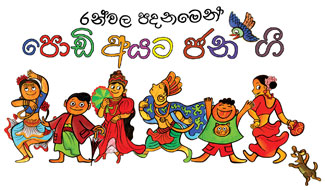
Podi Ayata Jana Gee |
Gama Avulannan
Gama Avulannan comprises original songs composed by maestro Lionel
Ranwala. Songs likeSansare Ma and Paramaruwenne Eyi Nangiye are included
in the line up with Udara Maubima, a song with patriotic sentiments,
wrapping up the show. Though it is aimed at popularizing folk songs it
also conveys the idea that people should show more concern about the
country’s history and future.
*****
Yuddhetath Evith
The show in a way of a ‘cultural war’ is intended to attack the
spreading alienisms and eroding of traditional values of the country.
The event is organised by Lionel Ranwala Brigade which make up of
several organizations including Thalama Jathika Padanama, Senkadagala
Jana Gee Kandayama and Matuparapura.
****
Velava Keeyada?
The drama was penned by Sahan as a part of his degree in Drama and
Theatre at Kelaniya University. Rich in aesthetic quality the drama
embodies a timely message: the futility of the targets behind the
competitive society. According to Sahan the inspiration for the creation
emerged out of self experience. He notes that though time is precious,
hardly anyone put it to good use. They are too busy running after a
hallucination to spend a few moments with their friends and loved ones.
The drama is chosen for the finals of this year’s State Drama
Festival. |



